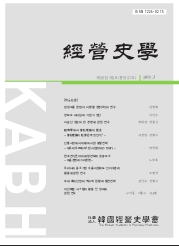학술논문
日帝下 民族系 企業集團 形成과 性格에 관한 硏究
이용수 20
- 영문명
- A study on the characteristics and formation of Korean big business group under Japanese rule
- 발행기관
- 한국경영사학회
- 저자명
- Kim Sung Soo(金聖壽)
- 간행물 정보
- 『경영사연구(경영사학)』제13집 제1호(통권17호), 5~35쪽, 전체 31쪽
- 주제분류
- 경제경영 > 경영학
- 파일형태
- 발행일자
- 1998.06.30
6,520원
구매일시로부터 72시간 이내에 다운로드 가능합니다.
이 학술논문 정보는 (주)교보문고와 각 발행기관 사이에 저작물 이용 계약이 체결된 것으로, 교보문고를 통해 제공되고 있습니다.

국문 초록
영문 초록
The purpose of this study is to investigate the colonial characteristics and capital formation of Korean Big Business Group under the Japanese rule between 1920 and 1940 with respect to the industrial development, the Japanese imperialistic colony policy in Korea can be divided into two major period. The first period(1920-1930) was the p&iod of an established colony, and the second period (1931-1940) was the period of aggressive wars for the purpose of expanding its colonial organization.
The first period(l910-1930), the period of an established colony, as a result of the 1919 independence government the Japanese imperialists gave up the military government and advocated the so-called culture government, which was a very deceitful one. Accordingly, the Japanese government began to rear Japanese industries in Korea. On April 1. 1920, the ten-year old “Chosun Hwesa Ryung”, or the measure for korean company, was removed. This removal was a great turning point in the colonial policy of Japan. The main purpose of the abolition was to permit investments of the Japanese capital into the development of modern industries in korea.
In the 1930’s the annual industrial development was marked 13.5%. This was mainly due to the acceleration of the heavy chemical industry and the decade may be designated as a period of “Korean indurstrialization” and formation of “Big Business Group” of Korean capitals.
In order to continue business and to accumulate property, korean native capitals help the Japanese authorities to control the colony, Korea. With the increase of this sort of businessman the native capital become a parasitic one. There appeared a group of Pro-Japanese parasitic capitals who did not hesitate to conspire with the Japanese capital to achieve a maximal monetary capacity. These native capitals, became the anti-national Big Business Group what has been discussed on the colonial characteristics of Korean Big Business Group under the Japanese Control can be as follows :
(1) the colonial legacies of Korean Big Business Group revealed the economical double structure.
(2) parasitism of the native capitals
(3) pro-Japanese conduct of the native capital
After all, these colonial characteristics of Korean Big Business Group under the Japanese Rule hindered the formation of capitalism in Korea and remained as colonial legacies.
목차
Ⅰ. 序論
Ⅱ. 企業集團의 槪念과 特徵
Ⅲ. 民族系 企業集團의 形成과 그 背景
Ⅳ. 日帝下 民族系 資本形成의 實態
Ⅴ. 日帝下 民族系 企業集團 形成의 事例
Ⅵ. 日帝下 民族系 企業集團의 性格
Ⅶ. 結論
參考文獻
Abstract
해당간행물 수록 논문
참고문헌
교보eBook 첫 방문을 환영 합니다!

신규가입 혜택 지급이 완료 되었습니다.
바로 사용 가능한 교보e캐시 1,000원 (유효기간 7일)
지금 바로 교보eBook의 다양한 콘텐츠를 이용해 보세요!






